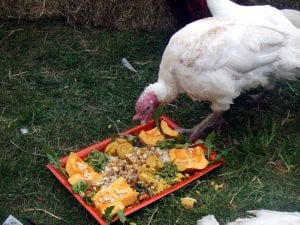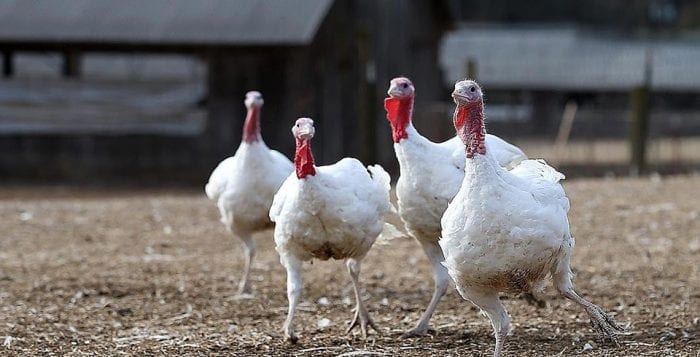Ask the Vet: Do turkeys make good pets?
By Matthew Kearns, DVM

When I think of turkeys in the month of November, I usually am thinking about a main course with a little stuffing, potatoes, gravy and cranberry sauce. However, many believe turkeys can also make good pets. Domesticated turkeys are quite friendly and can be socialized to humans and other pets.
Before considering acquiring any turkeys please make sure to consult your neighbors. Turkeys (especially males) will make a gobble sound in reaction to any strange noise and the females will make a variety of sounds. What I mean is, both genders make a lot of noise.
Make sure there is enough room to exercise. Turkeys need about 90 square feet to be able to properly “shake their tail feathers” and make sure the enclosure has a fence that is at least 6 feet high. Most domesticated turkeys cannot, or will not, attempt to fly over the fence, but it is possible and they may require routine clipping of the flight feathers to prevent a “great escape.” They also need safety from predators at night. A commercially made turkey pen or 8×6-foot garden shed makes a good enclosure. This size shed can house up to more than one turkey.
Good husbandry is a key. A dirt floor with either hay or shavings is easiest to keep clean and not hard on the turkey’s feet. The hay or shavings should be changed every few days.

There is also one consideration if you wish to keep both turkeys and chickens as pets. Chickens carry but are not affected by a single-celled parasite called Histomanis meleagridis, leading to a condition known as blackhead. This parasite causes diarrhea, liver damage and sudden death in turkeys. Therefore, do not house the turkeys and chickens together, nor keep the turkeys in an area that has recently been used by chickens. Periodic treatments with anti-parasitc medications also reduce the risk of blackhead.
Food is easy. Fowl pellets are the mainstay of their diet and they can be bought at any feed store or online. Young turkeys may initially prefer to eat bugs such as crickets, mealworms and beetles but will quickly transition to pellets if you crush the bugs and pellets and mix them together.
Turkeys also will eat a variety of fruits, vegetables and nuts. Items such as kale, grapes, berries, etc. are all delicious additions to a turkey’s diet. Crushed oyster shells make not only an excellent source of calcium but also help grind food for digestion in a part of the turkey’s stomach called the gizzard.
I have to admit that I don’t own any turkeys, nor have I treated any turkeys but who knows what the future holds. “Gobble, Gobble”!!!!!
Dr. Kearns practices veterinary medicine from his Port Jefferson office and is pictured with his son Matthew and his dog Jasmine. Have a question for the vet? Email it to [email protected] to see his answer in an upcoming column.







